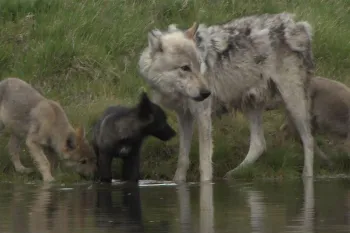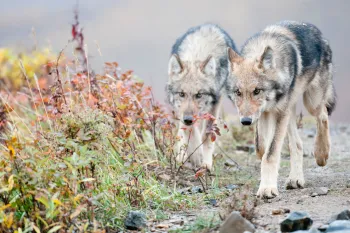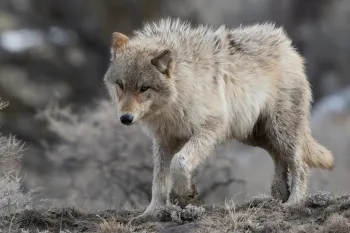This week, a federal judge ruled that the U.S. Fish and Wildlife Service broke the law when it decided not to protect gray wolves in the Northern Rocky Mountains under the federal Endangered Species Act. The ruling is the result of a lawsuit that we and our allies filed last year challenging the agency’s decision.
Wolves are deeply intelligent, social animals who play an irreplaceable role in their ecosystems. Yet since losing federal protections in the 2010s, wolves in the Northern Rocky Mountains have suffered relentless persecution by trophy hunters, trappers and predator control agents. Conditions for wolves in Idaho and Montana became even worse in 2021 after those states enacted policies aimed at decimating wolf populations through killing.
Such public policy is wrong for so many reasons. It not only treats wolves as worthless nuisances, but it also threatens the genetic health of existing wolf populations and threatens to stymie wolf expansion into highly suitable habitat in areas such as California and Colorado.
In the face of such recklessness, we and our allies submitted a legal petition to the U.S. Fish and Wildlife Service in May 2021 requesting that federal protections be restored to wolves in the Northern Rocky Mountains. The agency determined that our request might be warranted in September 2021, when it launched a review of their status. Yet, in February 2024, the agency ultimately denied our petition—despite finding that wolf killing under state laws could reduce the region’s wolf population from an estimated 2,534 wolves to as few as 667 wolves.
We believed the agency’s determination was wrong both legally and scientifically, so we sued. Lawyers on our Animal Protection Law team argued the case in court in June, and now a federal judge in the district of Montana has agreed with us. He concluded that there were several problems with the U.S. Fish and Wildlife Service’s determination not to protect wolves in the Northern Rocky Mountains, ruling that the agency:
- Violated the Endangered Species Act when it failed to consider the potential importance of highly suitable, but currently unoccupied, historical wolf range in the western United States.
- Illegally disregarded the potential significance of the wolf’s nascent return to Colorado, through natural dispersal and historic reintroduction efforts.
- Improperly relied on Idaho and Montana’s methods for estimating wolf populations without addressing blistering scientific criticism of those methods.
- Failed to apply the best available science about genetic threats stemming from small population size.
- Incorrectly assumed wolf populations would remain connected even with high levels of killing in the Northern Rockies region.
Given these issues, the judge rejected the U.S. Fish and Wildlife Service’s determination that wolves in the Northern Rocky Mountains don’t need federal protection. The agency must now reanalyze the status of these wolves in line with the Endangered Species Act’s requirements and the judge’s ruling.
The fight for wolves in the region isn’t over—for now, wolves there remain federally unprotected. But this ruling is an essential step that could result in wolves in the Northern Rockies regaining protections. This will only happen if the federal government fulfills its duty under the Endangered Species Act. Democrats, Republicans and Independents have the opportunity to come together to recognize the importance of these apex predators. The parties across administrations have failed them—but we're determined to ensure they receive the protections they deserve.
The timing of the ruling comes just as gray wolf recovery is at a crossroads. Last month, Montana proposed changes to its state regulations, expressly intended to further reduce the state’s wolf population. If this proposal is finalized, a single person would be allowed to kill up to 30 wolves and up to 600 wolves could be killed this fall and winter through trophy hunting, recreational trapping and predator control.
With this week’s ruling, Montana and Idaho are once again on notice that their aggressive approach to wolf management could lead to the restoration of federal protection for wolves in the region.
Wolves are under serious threat overseas, too. Earlier this year, the European Union voted to reduce the protection status of wolves, sparking concerns that this change in status could lead to wolf culling rather than the promotion of wildlife coexistence efforts that so many citizens and animal welfare organizations champion.
History offers a grim lesson here in North America, because such killing campaigns pushed wolves in the contiguous United States to the brink of extinction. The U.S. Fish and Wildlife Service’s attempts to deny these animals much-needed federal protection makes a mockery of the law, flouts the will of countless Americans who want to see wolves protected, and increases the possibility that we might lose them forever. We can’t let that happen.
Sara Amundson is president of Humane World Action Fund.




